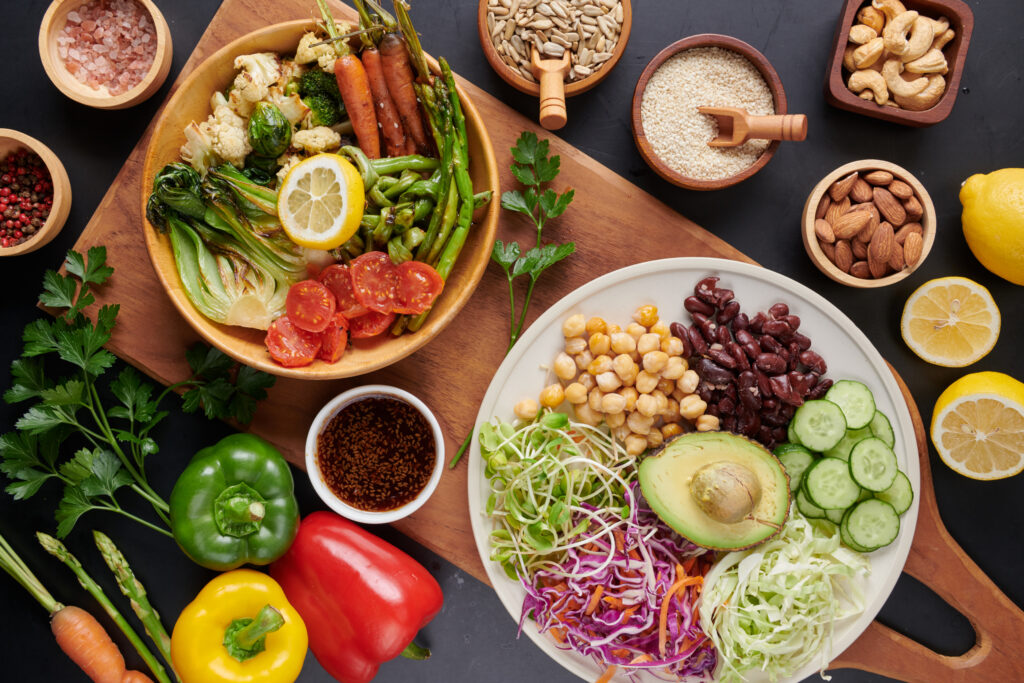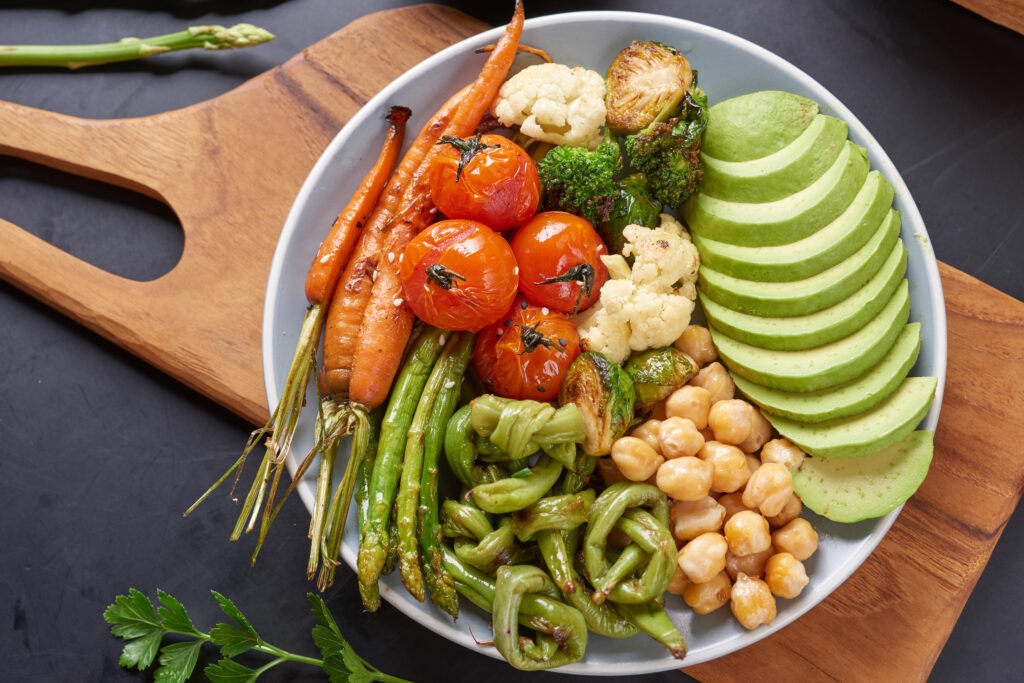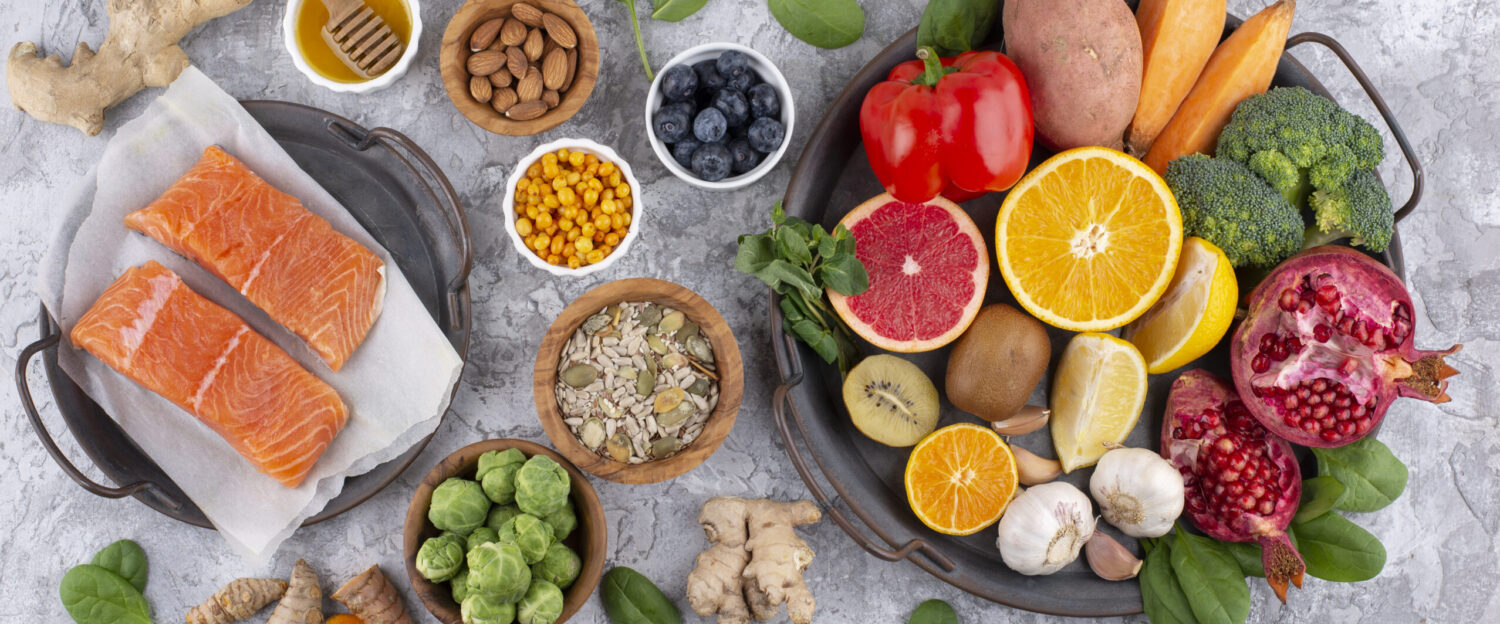
Table of Contents
What is Vegan Diet?
Vegan Food is a term used to determine a special diet. Vegan is a type of vegetarian diet that is against from consuming any animal products. This means, vegan diet avoids products produced from animal like meat, poultry, fish, dairy, eggs, and other animal-derived ingredients like honey. Instead, vegans depend on pure plant-based foods such as fruits, vegetables, grains, legumes, nuts, and seeds for their essential nutrition. Veganism is not only a dietary choice but often a lifestyle encompassing concerns about cruelty on animals consuming meat and products made with they skin and body parts, environmental sustainability, and personal health.
A vegan diet, when well-planned, can significantly enhance gut health and overall wellness. The high fiber content, rich array of nutrients, and absence of harmful substances commonly found in animal products contribute to these benefits. Addressing potential nutrient deficiencies and ensuring a balanced intake of diverse plant foods are key to reaping the full advantages of a vegan diet for gut health and overall well-being.
Vegan Diet Food List – What do vegan eat:

Here’s a basic list of vegan-friendly foods:
- Fruits: Some of the vegans fruits apples, bananas, oranges, berries, grapes, mangoes, pineapples, etc.
- Vegetables: Leafy greens (spinach, kale, lettuce), broccoli, carrots, bell peppers, tomatoes, cucumbers, zucchini, cauliflower, potato, sweet potato.
- Grains: Rice, quinoa, oats, barley, couscous, bulgur, farro, millet, etc.
- Legumes: Lentils, chickpeas, black beans, kidney beans, navy beans, pinto beans, soybeans, peas, etc.
- Nuts and Seeds: Almonds, walnuts, cashews, peanuts, chia seeds, flaxseeds, 66+6+pumpkin seeds, sesame seeds, etc.
- Plant-Based Protein Sources: Tofu, tempeh, seitan, edamame, vegan protein powders (pea protein, rice protein, hemp protein), etc.
- Plant-Based Dairy Alternatives: Almond milk, soy milk, oat milk, coconut milk, cashew milk, vegan cheese, vegan yogurt, etc.
- Whole Food Snacks: Hummus, guacamole, veggie sticks, mixed nuts, popcorn, rice cakes, fruit slices, energy bars (check ingredients for honey or dairy), etc.
- Herbs and Spices: Basil, cilantro, mint, oregano, thyme, turmeric, cumin, paprika, cinnamon, etc.
- Plant-Based Fats: Avocado, olives, coconut oil, olive oil, flaxseed oil, etc.
- Whole-Grain Products: Whole-grain bread, whole-wheat pasta, brown rice, whole-grain cereals, etc.
- Condiments and Flavorings: Mustard, ketchup, soy sauce, balsamic vinegar, nutritional yeast, tahini, salsa, hot sauce, etc.
This list is not exhaustive, but it covers many common vegan foods that can form the basis of a nutritious and delicious plant-based diet. Remember to check labels carefully when purchasing packaged or processed foods, as some may contain animal-derived ingredients.
Foods to be avoided by Vegans:
Vegans avoid all foods and ingredients derived from animals. Here’s a list of foods commonly avoided by vegans:
- Meat: Beef, pork, lamb, poultry (chicken, turkey), game meats, and any products made from these meats (e.g., sausages, bacon, deli meats).
- Seafood: Fish, shellfish (shrimp, crab, lobster, etc.), and other sea animals.
- Dairy Products: Milk, cheese, yogurt, butter, cream, and any products containing these ingredients.
- Eggs: Eggs in any form, including whole eggs, egg whites, and egg yolks, as well as products containing eggs (e.g., mayonnaise, certain baked goods).
- Honey: Honey is produced by bees and is therefore not considered vegan.
- Gelatin: Gelatin is derived from animal collagen and is commonly found in jellies, marshmallows, gummy candies, and certain desserts.
- Animal-Derived Additives: Some food additives and ingredients are derived from animals or their by-products, such as certain food colorings (e.g., cochineal, carmine), casein, whey, and certain emulsifiers and stabilizers.
- Certain Baked Goods: Some baked goods, such as cakes, cookies, and pastries, may contain eggs, milk, or butter. Vegans typically avoid these unless they are specifically labeled as vegan.
- Certain Beverages: Some beverages may contain animal-derived ingredients, such as certain types of beer, wine (processed with animal products like gelatin or isinglass), and some non-dairy milk alternatives that contain added vitamin D3 derived from lanolin (sheep’s wool).
- Processed Foods: Processed foods may contain hidden animal-derived ingredients or additives, so it’s essential for vegans to check ingredient labels carefully.
This list covers the main categories of foods avoided by vegans, but it’s important to note that there may be other less common animal-derived ingredients or products that vegans choose to avoid based on their personal principles and beliefs.
Health Benefits of Vegan Diet:
Vegans often experience several health benefits due to their plant-based diet. Here are some of the key health advantages associated with veganism:
- Lower Risk of Chronic Diseases: Research suggests that a well-planned vegan diet can lower the risk of chronic diseases such as heart disease, hypertension, type 2 diabetes, certain cancers (such as colorectal cancer), and obesity. This is largely attributed to the higher intake of fiber, antioxidants, vitamins, and minerals found abundantly in plant-based foods.
- Improved Heart Health: Vegan diets tend to be lower in saturated fats and cholesterol compared to omnivorous diets. By avoiding animal products, vegans often have healthier cholesterol levels and blood pressure, reducing their risk of heart disease and stroke.
- Weight Management: Due to the higher fiber content and lower calorie density of many plant-based foods, vegans may find it easier to manage their weight. Plant-based diets are typically associated with lower body mass index (BMI) and reduced risk of obesity.
- Better Digestive Health: The abundance of fiber in plant-based foods promotes healthy digestion and may reduce the risk of constipation, diverticular disease, and other gastrointestinal issues.
- Reduced Inflammation: Plant-based diets are naturally anti-inflammatory due to the high intake of fruits, vegetables, nuts, seeds, and whole grains. Chronic inflammation is linked to various diseases, and reducing inflammation can have numerous health benefits.
- Improved Blood Sugar Control: Vegan diets rich in whole grains, legumes, fruits, and vegetables can help stabilize blood sugar levels, making them beneficial for individuals with type 2 diabetes or those at risk of developing the condition.
- Lower Risk of Certain Cancers: Some studies suggest that vegan diets may be associated with a lower risk of certain cancers, particularly colorectal cancer. This is attributed to the protective effects of fiber, antioxidants, and phytochemicals found abundantly in plant foods.
- Better Kidney Function: Plant-based diets may help improve kidney function and reduce the risk of kidney disease progression, especially in individuals with chronic kidney disease.
- Improved Overall Nutrient Intake: While careful planning is essential to ensure adequate intake of certain nutrients like vitamin B12, calcium, iron, and omega-3 fatty acids, a well-balanced vegan diet can provide all the essential nutrients for optimal health.
- Longevity: Some observational studies suggest that individuals following vegan or vegetarian diets may have a lower risk of premature death and greater longevity compared to those consuming animal-based diets.
Potential Challenges and Considerations
- Nutrient Deficiencies
- Vitamin B12: Vegans need to ensure adequate intake of vitamin B12, which is primarily found in animal products. Supplementation or fortified foods are necessary.
- Iron and Zinc: Plant-based sources of iron and zinc are less readily absorbed by the body. Consuming a variety of plant foods and pairing them with vitamin C-rich foods can enhance absorption.
- Omega-3 Fatty Acids: While plant-based sources like flaxseeds and walnuts provide omega-3s, they may not be as bioavailable as those from fish. Algal oil supplements can be a good alternative.
- Protein Sources
- Complete Proteins: Combining different plant-based protein sources (e.g., beans and rice) can ensure a complete amino acid profile.
- Variety: Including a wide variety of protein-rich plant foods like legumes, nuts, seeds, and whole grains can meet protein needs effectively.
- Digestive Adjustments
- Increased Fiber: The shift to a high-fiber diet can initially cause bloating and gas. Gradually increasing fiber intake and drinking plenty of water can help the digestive system adjust.
Vegan Food Recipes:
Here are some popular vegan Indian recipes:
- Chana Masala: A flavorful chickpea curry cooked with onions, tomatoes, garlic, ginger, and a blend of aromatic spices like cumin, coriander, turmeric, and garam masala.
- Baingan Bharta: Roasted and mashed eggplant cooked with onions, tomatoes, garlic, and spices like cumin, coriander, turmeric, and chili powder.
- Aloo Gobi: A classic dish made with potatoes (aloo) and cauliflower (gobi) cooked with onions, tomatoes, ginger, garlic, and spices like cumin, turmeric, coriander, and garam masala.
- Palak Paneer (Vegan Version): A creamy spinach curry made with pureed spinach, tofu (or paneer substitute), onions, tomatoes, garlic, ginger, and spices like cumin, coriander, turmeric, and garam masala.
- Vegetable Biryani: Fragrant basmati rice cooked with mixed vegetables (such as carrots, peas, potatoes), onions, tomatoes, garlic, ginger, and a blend of biryani spices.
- Dal Tadka: A comforting lentil dish made with yellow lentils (toor dal), tempered with cumin seeds, mustard seeds, garlic, ginger, and green chilies, and flavored with tomatoes, onions, turmeric, and coriander.
- Masoor Dal: Red lentils cooked with onions, tomatoes, garlic, ginger, and spices like cumin, coriander, turmeric, and chili powder.
- Roti (Chapati): Whole wheat flatbread cooked on a griddle and served with various curries or dals.
- Lady Finger Fry: Every one favorite vegetable with many variant recipes.
- Coconut Chutney: A refreshing condiment made with grated coconut, green chilies, ginger, cilantro, and spices like cumin seeds and mustard seeds, tempered with curry leaves and served with dosas or idlis.
These are just a few examples of vegan Indian recipes. Indian cuisine offers a wide variety of plant-based dishes rich in flavor and nutrition, making it easy and enjoyable to follow a vegan diet.
10 Best Vegan Restaurants in Hyderabad:
1. E wok Vegan Cafe
2. The Weekend Cafe
3. Bon Appediet
4. Fab Cafe
5. Terranee Cafe
6. Aura Cafe
7. Oak Leaf
8. Gabru Di Chaap
9. Vibrant Living
10. Sage Faren Cafe
Overall, adopting a vegan lifestyle can offer numerous health benefits, provided that the diet is well-planned and includes a variety of nutrient-rich plant-based foods. It’s essential for vegans to pay attention to their nutritional needs and consider consulting a healthcare professional or registered dietitian for personalized guidance.
